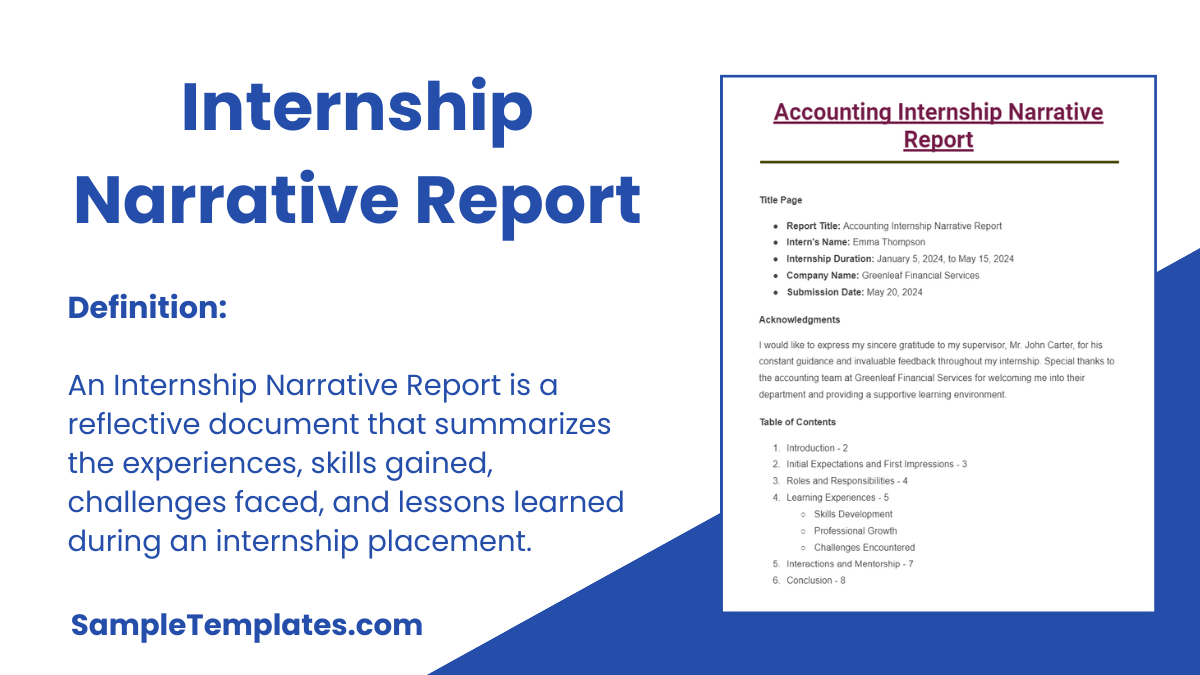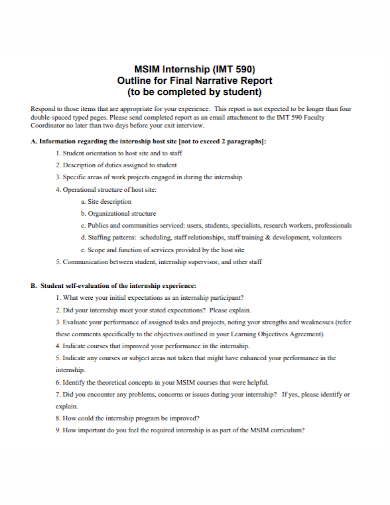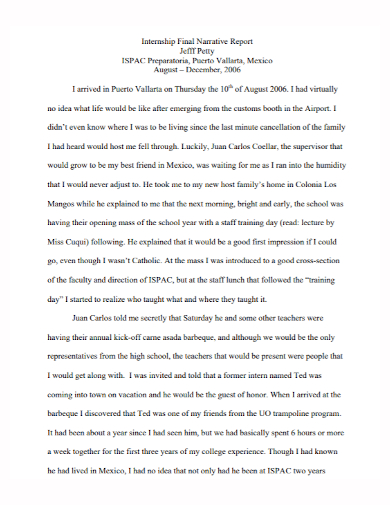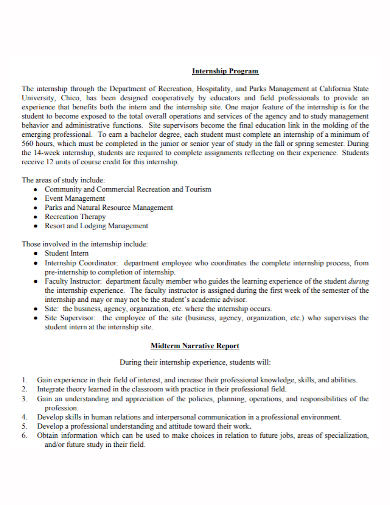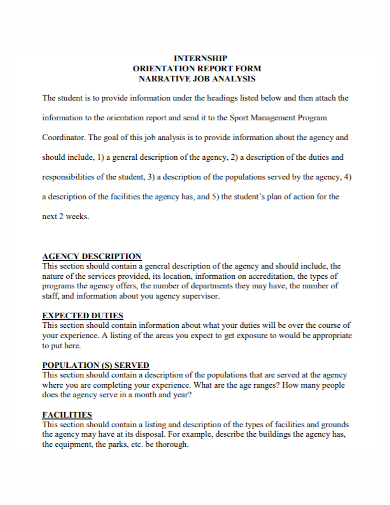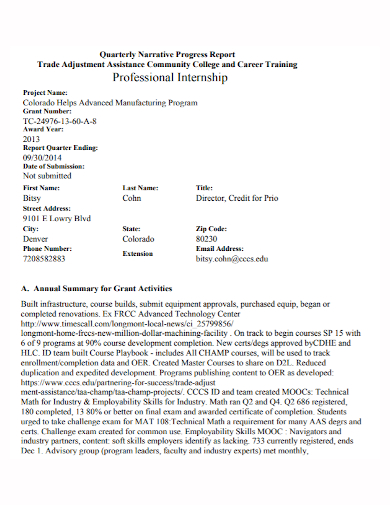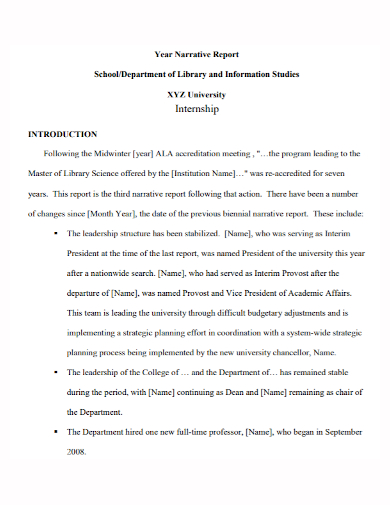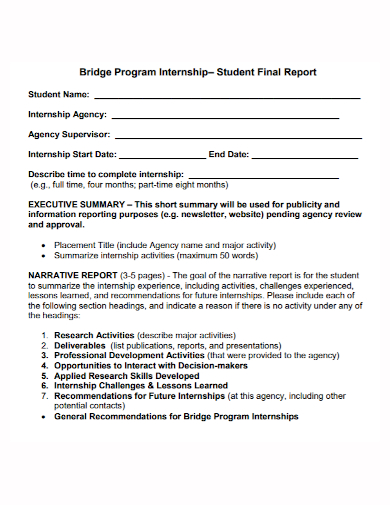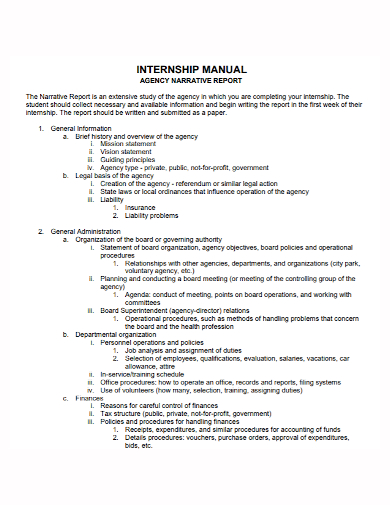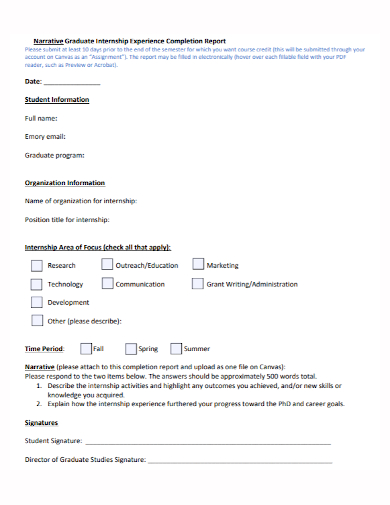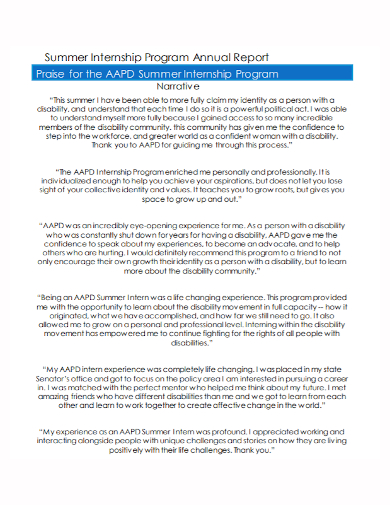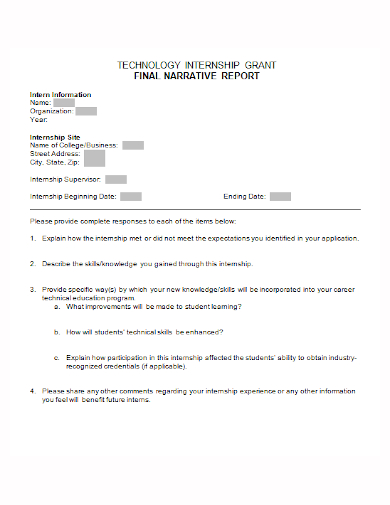Every student, especially undergraduates, who are about to graduate from college or university is required to have an internship experience in their chosen field of study. This will allow them to get exposed to the industry they want to work in in the future. And when the time comes for the student to finish their internship experience, they are required to pass an internship report that narrates their experience, the lessons and skills they learned, and the training they undergo during their internship. If you’re an intern who just completed your internship and need to write a report, this article will guide you on how to write an internship narrative report.
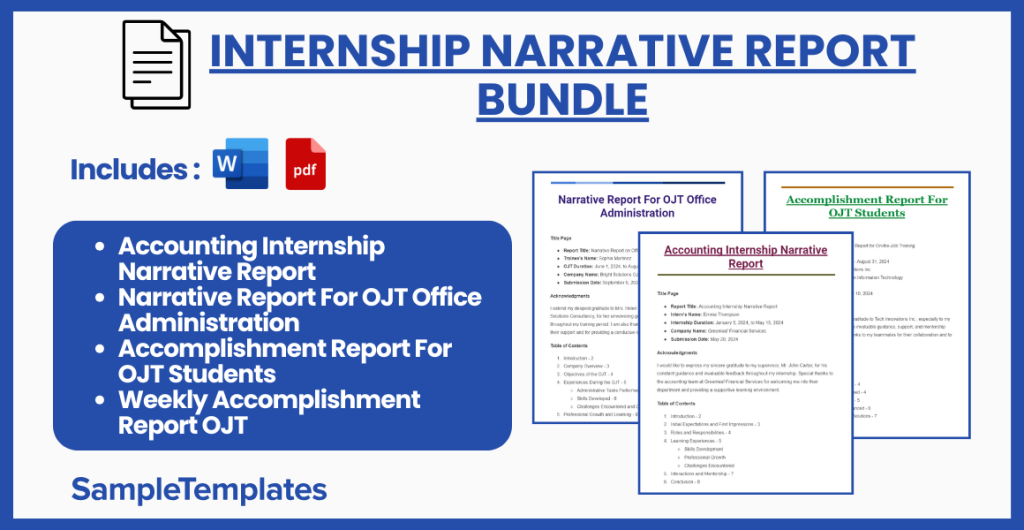
Download Internship Narrative Report Bundle
Accounting Internship Narrative Report
Title Page
- Report Title: Accounting Internship Narrative Report
- Intern’s Name: Emma Thompson
- Internship Duration: January 5, 2024, to May 15, 2024
- Company Name: Greenleaf Financial Services
- Submission Date: May 20, 2024
Acknowledgments
I would like to express my sincere gratitude to my supervisor, Mr. John Carter, for his constant guidance and invaluable feedback throughout my internship. Special thanks to the accounting team at Greenleaf Financial Services for welcoming me into their department and providing a supportive learning environment.
Table of Contents
- Introduction – 2
- Initial Expectations and First Impressions – 3
- Roles and Responsibilities – 4
- Learning Experiences – 5
- Skills Development
- Professional Growth
- Challenges Encountered
- Interactions and Mentorship – 7
- Conclusion – 8
- Appendices – 9
Introduction
Company Overview: Greenleaf Financial Services is a mid-sized firm specializing in accounting and financial consulting services for small to medium enterprises (SMEs). The accounting department, composed of 15 dedicated professionals, focuses on providing comprehensive accounting services, including tax planning, auditing, and financial analysis.
Objectives: My goals for this internship included gaining hands-on experience with accounting software, understanding the end-to-end accounting cycle, and improving my analytical skills through real-world financial analysis.
Body of the Report
Initial Expectations and First Impressions
Entering the internship, I expected a fast-paced environment with a steep learning curve. My first day confirmed this, as I was immediately introduced to the team and briefed on ongoing projects. The welcoming atmosphere and structured orientation process exceeded my expectations and eased my initial nervousness.
Roles and Responsibilities
During my internship, I was responsible for assisting with monthly bank reconciliations, preparing journal entries, and supporting the year-end audit process. A significant project I contributed to was the optimization of the quarterly reporting process, where I analyzed current procedures and suggested efficiency improvements that were later implemented.
Learning Experiences
- Skills Development: I developed proficiency in using QuickBooks and Excel for financial modeling, which were pivotal in completing my assigned tasks.
- Professional Growth: The hands-on experience reinforced my decision to pursue a career in accounting, particularly in financial analysis.
- Challenges Encountered: A major challenge was adapting to the fast-paced environment and managing concurrent deadlines. With time-management strategies and mentorship, I improved significantly, which was reflected in my performance and feedback.
Interactions and Mentorship
The regular feedback sessions with Mr. Carter were instrumental in my growth, offering insights not only into my work but also into the accounting profession as a whole. Collaborating with colleagues on various projects enhanced my teamwork and communication skills.
Conclusion
Reflecting on my internship, it was a profoundly enriching experience that exceeded my objectives. It solidified my passion for accounting and equipped me with skills and insights that I am eager to apply in my future career. I am particularly interested in exploring financial analysis further, inspired by the project work I engaged in during my internship.
Appendices
- Appendix A: Certificate of Completion
- Appendix B: Project Report on Quarterly Reporting Optimization
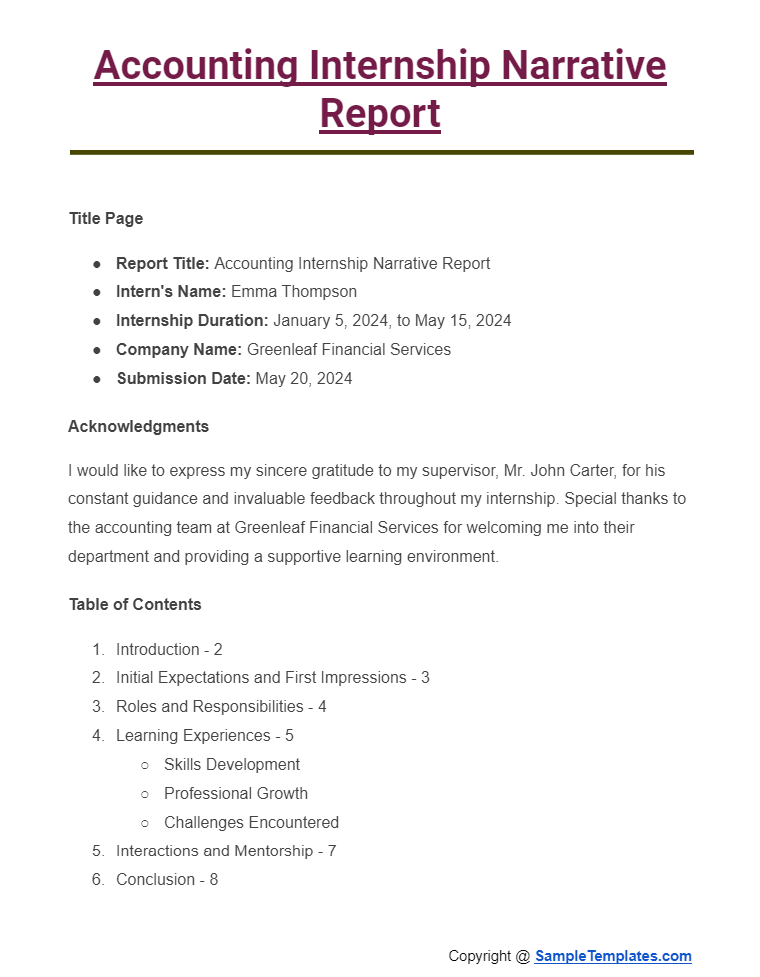
Narrative Report For OJT Office Administration
Title Page
- Report Title: Narrative Report on Office Administration On-the-Job Training
- Trainee’s Name: Sophia Martinez
- OJT Duration: June 1, 2024, to August 31, 2024
- Company Name: Bright Solutions Consultancy
- Submission Date: September 5, 2024
Acknowledgments
I extend my deepest gratitude to Mrs. Helen Thompson, my supervisor at Bright Solutions Consultancy, for her unwavering guidance, patience, and invaluable advice throughout my training period. I am also thankful to the entire administrative team for their support and for providing a conducive learning environment.
Table of Contents
- Introduction – 2
- Company Overview – 3
- Objectives of the OJT – 4
- Experiences During the OJT – 5
- Administrative Tasks Performed – 5
- Skills Developed – 6
- Challenges Encountered and Overcome – 7
- Professional Growth and Learning – 8
- Conclusion – 9
- Appendices – 10
Introduction
This report provides a comprehensive overview of my On-the-Job Training at Bright Solutions Consultancy, focusing on my experiences, the skills I developed, and the challenges I overcame. The training was a valuable opportunity to apply theoretical knowledge to real-world administrative tasks.
Company Overview
Bright Solutions Consultancy is a leading management consultancy firm specializing in business process optimization. The office administration department plays a crucial role in ensuring efficient operations across all departments.
Objectives of the OJT
My goals were to gain hands-on experience in professional office administration, enhance my organizational and communication skills, and understand the dynamics of working in a fast-paced business environment.
Experiences During the OJT
Administrative Tasks Performed
I was responsible for scheduling client meetings, managing email correspondence, organizing files, and assisting in the preparation of monthly reports. A significant project I contributed to was organizing a three-day team-building retreat, involving venue selection, participant coordination, and material preparation.
Skills Developed
The OJT significantly improved my proficiency in Microsoft Office Suite, particularly Excel and PowerPoint. I also honed my time management, multitasking, and communication skills, learning to navigate professional interactions with both colleagues and clients effectively.
Challenges Encountered and Overcome
Initially, managing the high volume of tasks was challenging. However, by prioritizing tasks, creating a daily work plan, and seeking timely feedback from my supervisor, I improved my efficiency and accuracy in task completion.
Professional Growth and Learning
The OJT was instrumental in solidifying my interest in office administration as a career path. It illuminated the importance of adaptability, continuous learning, and effective communication in a professional setting.
Conclusion
The OJT at Bright Solutions Consultancy was an immensely rewarding experience that exceeded my expectations. It has equipped me with practical skills and knowledge essential for my future career in office administration and has motivated me to pursue further studies and certifications in this field.
Appendices
- Appendix A: Certificate of Completion
- Appendix B: Sample of a Monthly Report I Assisted In.
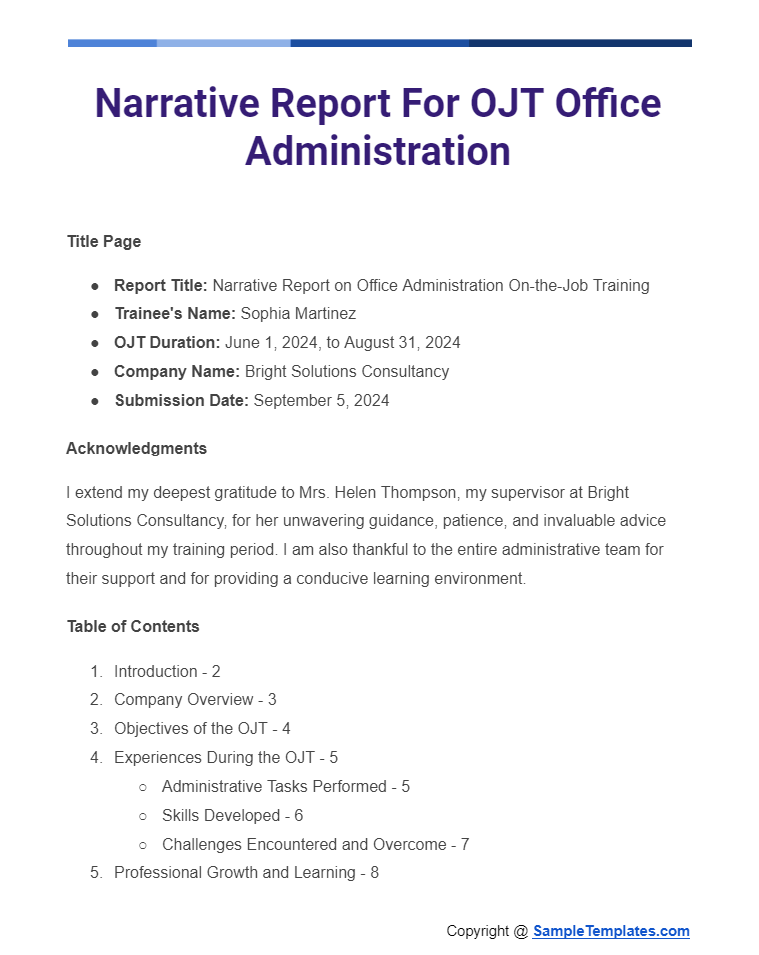
Accomplishment Report For OJT Students
Title Page
- Report Title: Accomplishment Report for On-the-Job Training
- Student Name: Alex Johnson
- OJT Duration: March 1, 2024 – August 31, 2024
- Company Name: Tech Innovations Inc.
- Course: Bachelor of Science in Information Technology
- University: City University
- Submission Date: September 10, 2024
Acknowledgments
I would like to express my profound gratitude to Tech Innovations Inc., especially to my supervisor, Ms. Diana Roberts, for the invaluable guidance, support, and mentorship throughout my internship. Special thanks to my teammates for their collaboration and to City University for this opportunity.
Table of Contents
- Introduction – 2
- Objectives of the OJT – 3
- Summary of Accomplishments – 4
- Technical Skills Developed – 4
- Projects Contributed To – 5
- Professional Skills Enhanced – 6
- Challenges Encountered and Solutions – 7
- Conclusion and Reflection – 8
- Appendices – 9
Introduction
This report outlines my accomplishments during my six-month internship at Tech Innovations Inc., a leading software development company specializing in cloud solutions. It provides insights into the skills I developed, the challenges I faced, and the professional growth I experienced.
Objectives of the OJT
- To apply theoretical knowledge from my Information Technology course in real-world software development projects.
- To gain hands-on experience with cloud computing technologies.
- To develop professional skills, including teamwork, communication, and problem-solving.
Summary of Accomplishments
Technical Skills Developed
- Cloud Computing: Gained practical experience with Amazon Web Services (AWS), contributing to the deployment of scalable applications.
- Software Development: Participated in the full software development lifecycle of a project management tool, enhancing my coding skills in Python and JavaScript.
- Database Management: Assisted in database design and management using MySQL, improving data retrieval and storage processes.
Projects Contributed To
- Project Management Tool Development: Contributed to developing features for a project management tool, focusing on user authentication and dashboard analytics.
- Cloud Migration Project: Participated in migrating on-premise applications to AWS, gaining insights into cloud infrastructure and security best practices.
Professional Skills Enhanced
- Teamwork: Collaborated with a diverse team of developers, designers, and project managers, enhancing my teamwork and collaboration skills.
- Communication: Developed effective communication skills through regular team meetings and presentations to management.
- Time Management: Learned to manage multiple tasks efficiently under tight deadlines, prioritizing tasks to meet project milestones.
Challenges Encountered and Solutions
Faced challenges in adapting to the fast-paced environment and understanding complex cloud technologies. Overcame these by leveraging online resources, seeking mentorship from colleagues, and dedicating extra hours to hands-on practice.
Conclusion and Reflection
The OJT at Tech Innovations Inc. was a transformative experience that not only allowed me to apply my academic knowledge but also taught me valuable industry skills. It has solidified my interest in cloud computing and prepared me for a future career in technology.
Appendices
- Appendix A: Certificate of Completion
- Appendix B: Feedback from Supervisor
- Appendix C: Sample Code from Project Management Tool Development
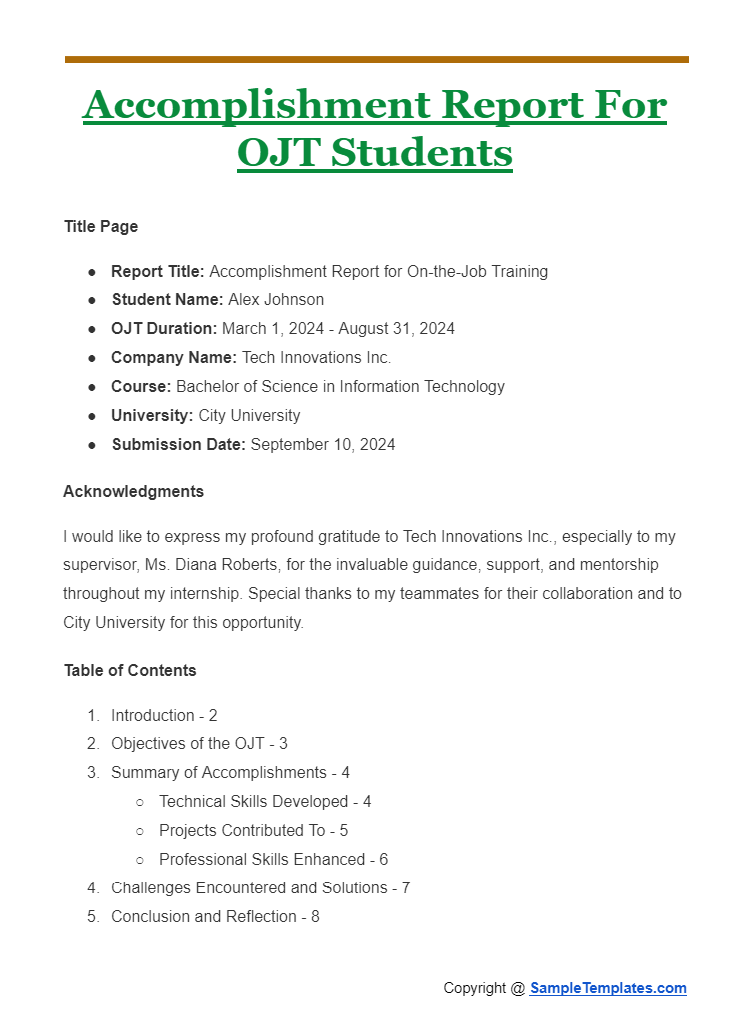
Weekly Accomplishment Report OJT
Weekly Accomplishment Report
Student Name: Emily Nguyen
Internship Position: Marketing Assistant
Company: Bright Horizons Advertising Firm
Week Covered: July 10 – July 14, 2024
Submission Date: July 15, 2024
Objectives for the Week
- To assist in the development and implementation of social media marketing strategies.
- To complete the first draft of the monthly client performance report.
- To enhance skills in using digital marketing tools, specifically Google Analytics and Hootsuite.
Tasks Completed
- Social Media Campaigns: Participated in brainstorming sessions for upcoming social media campaigns, contributing five original campaign ideas that were well-received by the team.
- Content Creation: Created and scheduled one week’s worth of content for three different clients across Facebook, Instagram, and Twitter using Hootsuite, ensuring alignment with each client’s brand voice.
- Client Performance Report: Compiled and analyzed performance data for the first draft of the monthly client performance report, focusing on key metrics such as engagement rates and campaign ROI.
Skills Developed
- Analytical Skills: Improved my ability to analyze social media metrics and interpret data to derive actionable insights, enhancing the effectiveness of marketing strategies.
- Creativity: Enhanced my creative thinking process through active participation in campaign brainstorming sessions, learning to propose innovative ideas that align with client objectives.
- Technical Proficiency: Gained hands-on experience with Hootsuite and Google Analytics, developing a deeper understanding of these tools for effective social media management and performance analysis.
Challenges Encountered and Solutions
- Challenge: Initially struggled with using Google Analytics to extract meaningful data for the client performance report.
- Solution: Sought guidance from my supervisor and completed an online tutorial on Google Analytics, which greatly improved my proficiency and enabled me to complete the report accurately and on time.
Plans for Next Week
- To finalize and present the monthly client performance report to the team for feedback.
- To continue developing social media content and campaign ideas for upcoming projects.
- To start learning about SEO best practices to contribute to future digital marketing strategies.
Feedback Requested
I would appreciate feedback on the client performance report’s format and content to ensure it meets the team’s expectations and provides valuable insights for our clients.
Supervisor’s Comments and Approval
[Space for supervisor’s comments and signature]
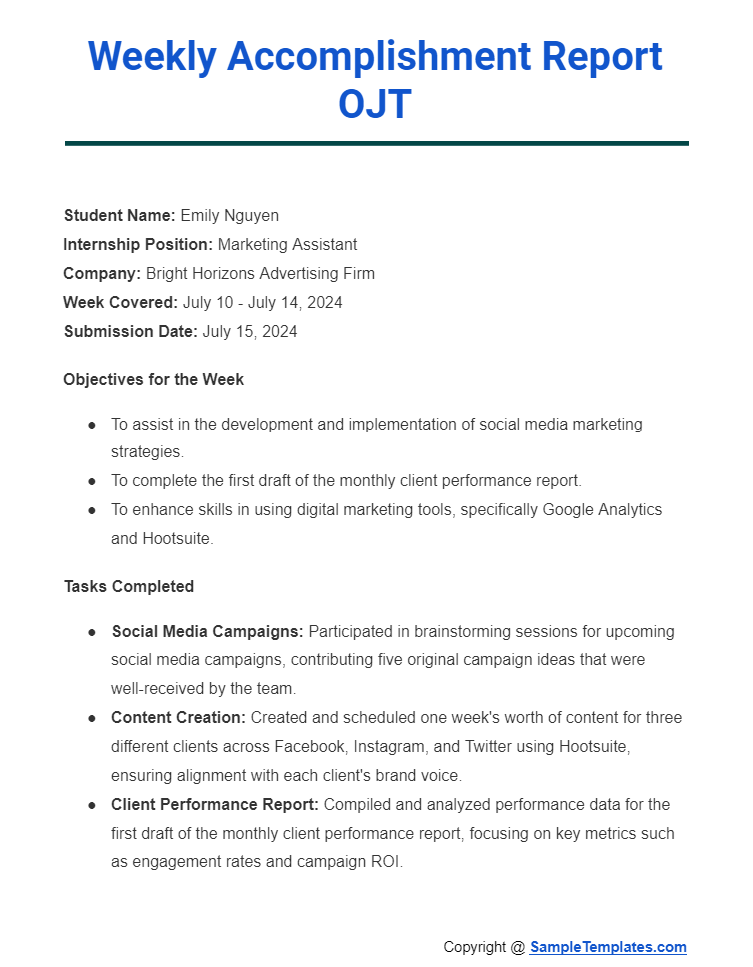
Browse More Templates On Internship Narrative Report
1. Student Internship Final Narrative Report
2. Internship Final Narrative Report
How to Create an Internship Narrative Report
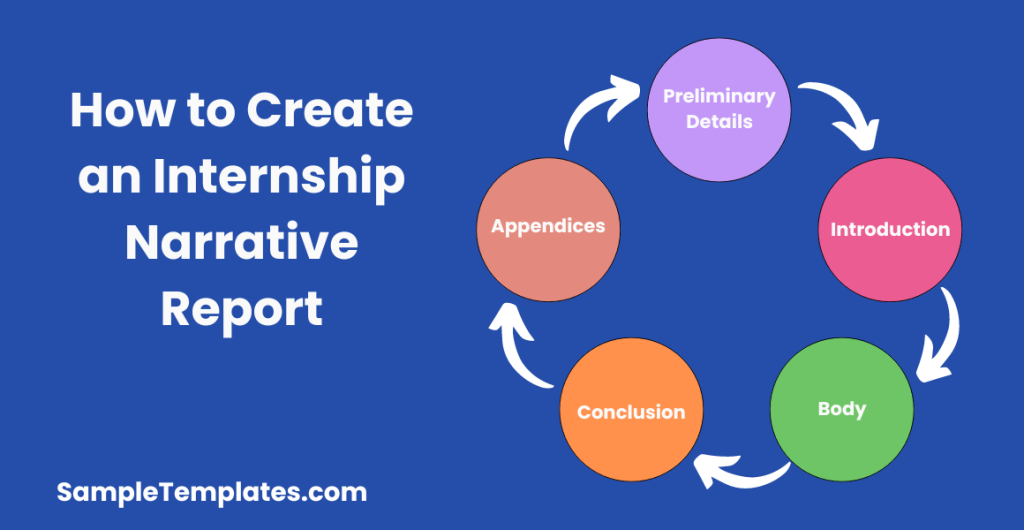
1. Preliminary Details
- Title Page: Include the report title, your name, the name of the institution or company where you interned, the period of your internship, and the date of submission.
- Acknowledgments: Optionally, thank individuals who guided or supported you during your internship.
2. Introduction
- Company Overview: Briefly describe the company, its mission, and the sector it operates in. Mention your department or team and the main focus of their work.
- Objectives: State your personal and academic objectives for undertaking the internship. Describe what you hoped to learn and achieve.
3. Body
Starting Your Journey
- First Impressions: Share your initial thoughts and feelings when starting the internship. What expectations did you have? What was your first day like?
- Roles and Responsibilities: Detail the tasks and responsibilities assigned to you. How did these tasks align with your skills and areas of study?
Learning and Development
- Challenges: Describe the challenges you faced and how you overcame them. Reflect on what these challenges taught you.
- Growth: Discuss specific instances where you felt you learned something significant or developed a new skill. Include projects or tasks that were particularly educational.
Interactions and Mentorship
- Work Environment: Narrate your experiences with the company culture and work environment. How did you adapt to it?
- Mentorship and Support: Talk about the support and guidance you received from your supervisors and colleagues. Highlight any mentorship moments that significantly impacted your internship experience.
4. Conclusion
- Reflection: Reflect on your overall internship experience. Did it meet your expectations and objectives? What were the key takeaways?
- Future Directions: Discuss how the internship has influenced your career aspirations or academic interests. Mention any plans or goals you have as a result of this experience.
5. Appendices (if applicable)
- Include any relevant documents, projects, or presentations you worked on during your internship. Ensure you have permission to share any confidential or proprietary information.
Writing Tips:
- Be Reflective: The narrative report is your personal story. Be introspective about your experiences and their impact on your professional and personal growth.
- Be Descriptive: Use vivid descriptions to bring your experiences to life. This helps the reader understand your journey and the internship environment.
- Be Honest: It’s important to honestly discuss both positives and negatives. Sharing how you dealt with challenges adds depth to your report.
- Maintain Professionalism: While narrative reports are personal, maintain a professional tone and respect confidentiality agreements.
This approach to writing an internship narrative report will not only fulfill academic or professional requirements but also serve as a valuable document for your personal and career development.
3. Internship Program Narrative Report
4. Internship Orientation Narrative Analysis Report
When is an Internship Narrative Report Necessary?
An Internship Narrative Report becomes necessary in several key contexts, each aimed at documenting and reflecting on the experiential learning gained during an internship. These contexts include:
- Academic Requirements: Many educational programs, especially those with a practical learning component like business, engineering, or healthcare, require students to complete an internship as part of their curriculum. The narrative report serves as a critical reflection on the student’s learning experience, demonstrating how theoretical knowledge was applied in a real-world setting. It’s often a requirement for course completion, grading, or obtaining credit.
- Professional Development Programs: Internship narrative reports can be part of professional development or fellowship programs that emphasize reflective learning and personal growth. Participants may be asked to write a sample report to articulate their professional journey, challenges faced, skills developed, and how the experience aligns with their career goals.
- Portfolio Building: Individuals looking to build a comprehensive professional portfolio might include narrative reports of their internships to provide context to their work samples and highlight their professional growth, learning outcomes, and achievements. This is particularly useful for fields where storytelling and personal brand are important, such as in creative industries, marketing, and communications.
- Feedback to Internship Providers: Some organizations request narrative reports from interns as a form of sample feedback on the internship program. This helps organizations understand the intern’s perspective, evaluate the effectiveness of their program, and identify areas for improvement.
- Scholarship or Grant Applications: When applying for scholarships or grants that require demonstrated professional or practical experience, a narrative report from an internship can serve as evidence of hands-on experience and learning. It showcases the applicant’s initiative, commitment to growth, and the practical application of their studies.
- Personal Reflection and Growth: Beyond formal requirements, writing a narrative report can be a valuable personal exercise. It allows individuals to reflect on their experiences, understand their strengths and weaknesses, and articulate their professional aspirations and how they simple plan to achieve them.
In each of these contexts, the narrative report is not just a documentation tool but a reflective exercise that enhances learning, provides insights into personal and professional development, and helps articulate future goals.
5. Internship Quarterly Narrative Progress Report
6. University Internship Narrative Report
7. Student Internship Program Narrative Report
Tips For Writing a Internship Narrative Report
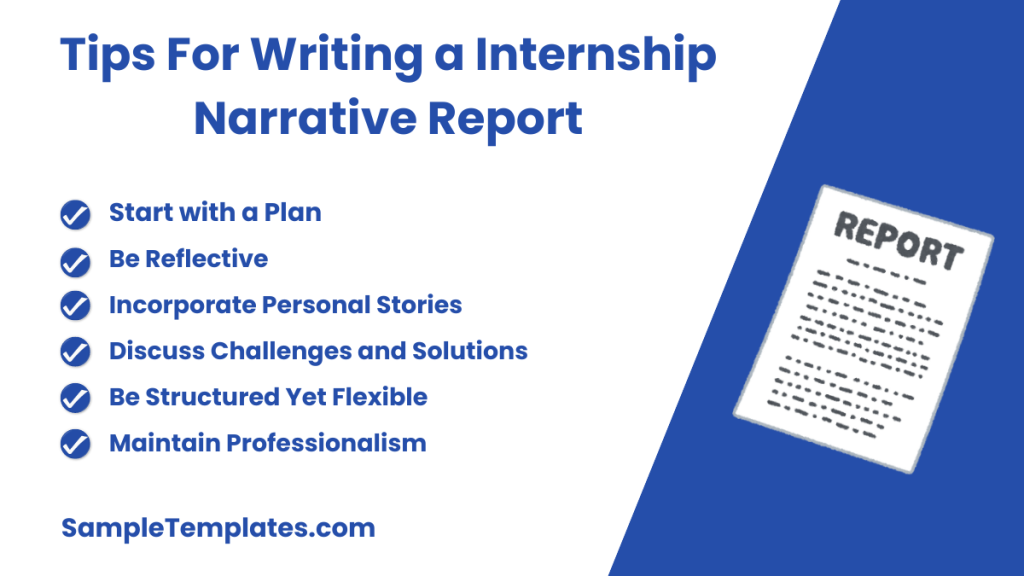
- Start with a Plan: Before you begin writing, outline the main sections of your report. Decide what key experiences, learnings, and challenges you want to highlight.
- Be Reflective: Use the report as an opportunity to reflect deeply on your experiences. Consider what you learned, how you grew, and how the experience has shaped your career aspirations.
- Incorporate Personal Stories: Personal anecdotes make your narrative engaging and relatable. Share specific instances that were meaningful or transformative for you.
- Focus on Learning and Development: Highlight the skills and knowledge you gained during the internship. Discuss how these learnings can be applied in future professional settings.
- Discuss Challenges and Solutions: Be honest about the challenges you faced and describe how you overcame them. This shows resilience and problem-solving skills.
- Include Interactions with Colleagues and Mentors: Share how working with others in a professional setting contributed to your growth. Mention any mentorship or support you received.
- Be Structured Yet Flexible: While it’s important to have a clear structure, allow your narrative to flow naturally. Don’t be afraid to deviate slightly from the sample plan if it enhances your story.
- Maintain Professionalism: Despite the narrative being personal and reflective, ensure your report maintains a professional tone. Avoid slang, and ensure your language is respectful and appropriate.
- Use Clear and Concise Language: Clarity is key in communication. Avoid jargon and overly complex sentences. Aim for a report that is accessible to readers unfamiliar with your field.
- Proofread and Edit: Typos and grammatical errors can distract from your message. Take the time to proofread your report thoroughly, or even ask someone else to review it for clarity and coherence.
8. Internship Manual Agency Narrative Report
9. Graduate Internship Narrative Report
10. Summer Internship Program Narrative Report
11. Technology Internship Grant Narrative Report
What is an internship report?
An internship report is a narrative summary of your internship experience in a particular company or organization. This is required by professors or internship coordinators of your school to inform them of the lessons and skills you learned and the opportunities and challenges you had to apply those skills in your experience. This information is crucial for your school to take note of to help improve their internship program for incoming students who will be doing an internship.
Details to Include in an Internship Narrative Report
1. Title Page
This is the first part of the narrative report. Put in your name, the location of your internship, the number of credits approved for the internship, and your contact information.
2. Introduction
The next part is the introduction. The first thing to input is to introduce the company you worked for in your internship. Describe the organization or company and include their brief history, their target market, and the services or products they provide. Next, describe your internship experience and show who you report to in the organization, and where you fit in the organization’s line of responsibility.
3. Duties and Responsibilities
For this section, list each major duties and responsibility you were assigned during the internship. Describe further the tasks you did that relate to your area of responsibility, and describe the difficulties that you encountered while doing them and the solutions you did to solve them.
4. Internship Discussion
This part is where you will discuss your internship experience. By doing this, you can discuss the following points:
- Were the internship objectives that your class provided was achieved during your experience?
- What skills were learned during the internship?
- What is your overall evaluation of the internship experience?
- Will the experience be beneficial to your professional and personal growth?
- Does it help you develop your competencies in working in the field?
- Does it help you get satisfied or dissatisfied with your career choice?
FAQs
What are the purposes of the internship narrative report?
There are many purposes of having a narrative report. Some of these are:
- It helps the intern develop written communication skills
- It serves as a record of the internship experience
- Allow the intern to reflect on the professional aspects of the experience and the skills that were learned, the goals that were achieved or not achieved.
What are the main objectives of an internship?
One of the main objectives of an internship is to expose a student to a particular job and a profession or industry. It also helps you learn certain skills that you will need when you will be working in that specific profession. It also helps you realize if the profession is what you would like to do as your career.
What is required for an internship?
For interns to apply to a company or organization, they need to pass a formal application, resume, cover letter, transcripts, two or three letters of recommendation. Even though not all internships have the same requirements, the ones mentioned above are usually the main application needed in most companies and organizations.
Although the next part will depend on your department, most of your internship coordinators might require photo documentation of you working during your internship. You might also asked to provide other documentation such as brochures, web pages, lesson plans, training schedules, or other documents that describe the company and your work as an intern. This will further give proof of your active involvement in the organization. Also, provide a thank you letter to your internship supervisor to show your appreciation to them for guiding you in your experience. Don’t forget to proofread your report once you’re done writing it. To help you get started on writing your narrative report, download our free sample templates above to serve s your guide!
Related Posts
FREE 10+ Monthly Accomplishment Report Samples
FREE 10+ Academic Progress Report Samples
FREE 10+ Problem Solving Report Samples
FREE 10+ Kindergarten Progress Report Samples
FREE 9+ Office Incident Report Samples
FREE 9+ Recruitment Report Samples
FREE 8+ School Accomplishment Report Samples
FREE 8+ Interview Essay Samples
FREE 7+ Death Investigation Report Samples
FREE 5+ Annual Work Summary Report Samples
FREE 15+ Blank Incident Report Samples
FREE 14+ Sample Incident Reports
FREE 12+ Sample Construction Progress Reports
FREE 10+ Field Trip Report Samples
FREE 10+ Student Incident Report Form Samples
